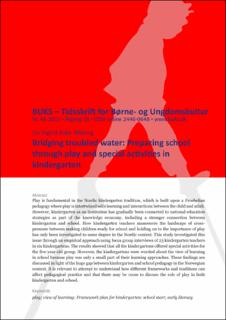Bridging troubled water: Preparing for school through play and special activities in kindergarten
Journal article
Published version
Permanent lenke
https://hdl.handle.net/11250/3042353Utgivelsesdato
2022Metadata
Vis full innførselSamlinger
Sammendrag
Play is fundamental in the Nordic kindergarten tradition, which is built upon a Froebelian pedagogy where play is intertwined with learning and interactions between the child and adult. However, kindergarten as an institution has gradually been connected to national education strategies as part of the knowledge economy, including a stronger connection between kindergarten and school. How kindergarten teachers manoeuvre the landscape of cross-pressure between making children ready for school and holding on to the importance of play has only been investigated to some degree in the Nordic context. This study investigated this issue through an empirical approach using focus group interviews of 23 kindergarten teachers in six kindergartens. The results showed that all the kindergartens offered special activities for the five-year-old group. However, the kindergartens were worried about the view of learning in school because play was only a small part of their learning approaches. These findings are discussed in light of the huge gap between kindergarten and school pedagogy in the Norwegian context. It is relevant to attempt to understand how different frameworks and traditions can affect pedagogical practice and that there may be room to discuss the role of play in both kindergarten and school.
